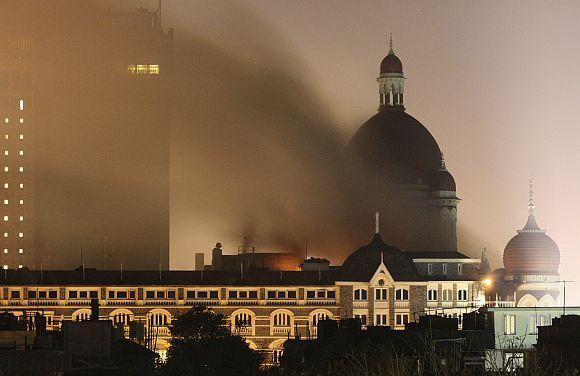 | « Back to article | Print this article |
 Vicky Nanjappa on why the proposed visit of the Pakistani judicial commission to India to probe the 26/11 attacks case is in India's best interest.
Vicky Nanjappa on why the proposed visit of the Pakistani judicial commission to India to probe the 26/11 attacks case is in India's best interest.
Bringing the 26/11 Mumbai attacks perpetrators to justice always tops the discussion every time India and Pakistan meet. Now that Pakistan President Asif Ali Zardari has said that his government is committed to bring the accused to justice, the ball is back in India's court.
The judicial commission from Pakistan will now visit India in November and carry out its cross-examination of witnesses before it submits its report to a court in that country.
Foreign Secretary Ranjan Mathai had recently said that they have taken a positive view of the request by Pakistan to examine India's 26/11 witnesses, but also added that they would need to seek clarification from the Bombay high court whether examination of witnesses by an alien government agency is possible.
While India has not yet sought any clarification from the Bombay high court, sources say that the Pakistan judicial commission would be in India to cross-examine the witnesses, which include the investigating officer who arrested lone surviving Lashkar-e-Tayiba gunman Ajmal Kasab, the additional chief metropolitan magistrate, and also the two doctors who examined Kasab after he had been captured.
Ujwal Nikam, the special public prosecutor in the 26/11 case, told Rediff.com that the matter is entirely up to the government.
"There has not been any move so far to seek a clarification before the Bombay high court. Moreover, there is no bar as such on cross-examining the witnesses provided the Government of India does not have a problem with it. Moreover, the prosecution in India would not have any objection if there is a cross-examination of this nature," Nikam says.
Ejaz Naqvi, the advocate who defended another accused, Sabahuddin Ahmed, in the case, said the cross-examination will take place in November. The commission would be visiting India and would first seek formal permission from the chief metropolitan magistrate in Mumbai before the testimonies could be recorded. "The question of seeking clarifications before the Bombay high court would not arise as there is no bar on such an examination provided both the countries have agreed to the same. If India feels that it would help speed up the process against the accused in Pakistan by allowing such a cross-examination, then it is in India's best interest," Naqvi said.
Justice Santosh Hegde, former judge of the Supreme Court, too pointed out that there is no bar on such cross-examination.
The commission would only examine the witnesses and report back to the court which is hearing the case in Pakistan, he noted.
Earlier, India had apprehensions about such an exercise as it felt that Pakistan would reject the evidence that has been dished out by the Indian investigators. Moreover, there was also a hue and cry in Pakistan regarding the same, with one of the defence counsels, Malik Rafique, saying that the credibility of the Indian prosecution was suspect as the trial was one-sided.
However, India felt that it was a ground that was being made up by Pakistan to reject the evidence. India had also felt that once the evidence was rejected, it would give Pakistan more ammunition to deny its involvement in the attack that killed 166 people.
However, today's scenario is a bit different. Many would feel that it would be in India's best interest to allow the examination, as it would help its commission and also the National Investigation Agency to conduct a probe on Pakistan soil.
For the NIA it is of extreme importance that it visit Pakistan and collect some evidence. This would help India put up a complete case, as there cannot be a question mark over the absence of examination conducted on Pakistan soil.
Image: A burning Taj Mahal Palace Hotel during the 26/11 terror attacks in Mumbai
Photograph: Reuters